Home > Electrify your fleet with Beev > How can a fleet of electric vehicles optimise your tax situation?
How can a fleet of electric vehicles optimise your tax situation?
How can the electrification of a car fleet be turned into a real tax lever for companies? In 2025, companies that adopt electric cars will benefit from considerable financial advantages, ranging from exemption from Company Vehicle Tax (CVT) to specific new depreciation limits. These schemes not only reduce costs, but also maximise the profitability of the energy transition, while complying with new regulatory obligations.
Over and above the savings generated, investing in clean vehicles goes hand in hand with a global strategy: control of the total cost of ownership (TCO), optimisation of taxation, anticipation of needs linked to the installation of charging points for professionals, and digital management thanks to solutions such as the Fleet Manager tool offered by Beev. Add to this the flexibility of a leasing offer for professionals, and electric mobility becomes not only an environmentally-friendly choice, but also a sustainable competitive advantage.
Table of contents
Electric fleet: How can you take full advantage of the VAT exemption and new depreciation ceilings in 2025?
In 2025, companies that are banking on a fleet of 100% electric vehicles benefit from major tax advantages, including total exemption from Company Vehicle Tax (TVS). This tax, now split into two components, CO₂ emissions and atmospheric pollutants, no longer applies to electric vehicles, provided they display the specific mention on their registration certificate. This exemption represents a substantial saving, often several hundred euros per vehicle each year, which significantly reduces the overall cost of ownership.
In addition, the new depreciation ceilings applicable to electric vehicles allow companies to write off up to around €30,000 for tax purposes - a higher ceiling than for combustion vehicles - and thus reduce their tax base. This twofold tax optimisation encourages the transition to sustainable mobility, while maximising the financial performance of fleet investments.
Electric cars and businesses: what are the tax strategies for maximising the profitability of your transition?

To maximise the profitability of the transition to electric vehicles, companies need to adopt an integrated tax strategy based on a number of complementary measures. The total exemption from company vehicle tax (TVS), which continues until 2025 for 100 % electric or hydrogen vehicles, remains a key tax lever: these vehicles are not subject to either the CO₂ emissions component or the atmospheric pollutants component. This exemption is automatic, with no time limit, as soon as the words "EE" appear on the registration certificate. In practice, this represents several hundred euros saved per vehicle per year, compared with a combustion or hybrid model that is now fully taxed.
At the same time, tax depreciation must be optimised, by selecting vehicles whose price remains compatible with the advantageous deduction ceilings, thereby maximising the depreciable portion of the cost. What's more, even though the national ecological bonus is no longer available to companies, certain local grants or conversion schemes are still available from time to time, and need to be identified according to the region or municipality in which the vehicle is registered.
VAT credit recovery applies to the electricity consumed, as well as to the maintenance and equipment costs associated with electric vehicles, provided that they are used strictly for business purposes. Finally, the use of modern fleet management tools enables detailed monitoring of consumption, mileage and operating costs, facilitating the ongoing adjustment of tax policy and contributing to optimised management of mobility expenditure.
VAT, depreciation, grants: how do you build a winning tax plan for the electrification of your fleet?
Building a winning fiscal plan around the electrification of a fleet requires mastery of three key pillars: the VAT, l'depreciation and public grants. VAT can still be reclaimed on the purchase of electric vehicles under certain conditions, although this is more restricted than for internal combustion vehicles. In addition, depreciation is calculated on the basis of the new ceilings specific to EVs, enabling tax deductions to be maximised from the very first years.
Companies also need to be aware of government and regional aid schemes, such as the ecological bonus or the conversion premiumsThese can represent savings of several thousand euros per vehicle. By intelligently combining these levers, it is possible to significantly reduce the net cost of investment and take full advantage of the tax benefits associated with the transition to a greener fleet.
How can we quantify and manage the fiscal impact of integrating electric vehicles in SMEs, ETIs and large companies?
Measure and monitor the fiscal impact of integrating electric vehicles into a company's fleet. company fleet requires a rigorous approach tailored to the size of the company. For SMEs, ETIs and large companies alike, it is crucial to establish a precise diagnosis of the total cost of ownership, taking into account savings on VAT, depreciation ceilings, VAT recovery and any subsidies received.
Using high-performance fleet management tools, we can simulate different scenarios and anticipate the fiscal impact on annual results. This analytical approach guarantees balanced management of costs, tax benefits and environmental objectives. In addition, the support of a tax expert or specialist firm is recommended to optimise complex tax parameters and ensure compliance with regulatory changes.
Manage your fleet easily with our dedicated tool
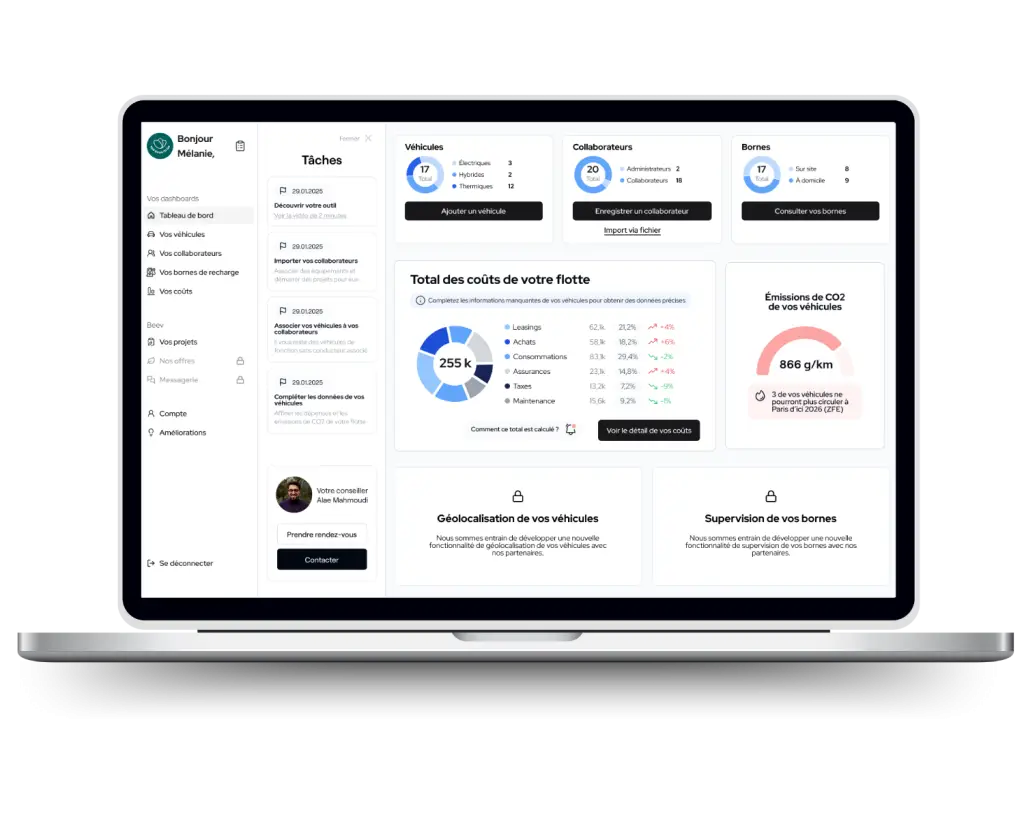
A fleet management tool from A to Z
- Add your fleet and employees in just a few clicks
- Plan your transition to electric vehicles and monitor your CSR objectives in real time
- Centralise your expenses

Company fleet: what tax mistakes should be avoided when switching to electric cars?
When switching to an electric fleet, many companies make tax mistakes that can reduce or even cancel out the expected benefits. Among the most common pitfalls is failure to comply with the conditions for exemption from VAT, in particular by choosing non-eligible or incorrectly registered hybrid vehicles. Incorrect assessment of depreciation ceilings can also lead to unnecessary extra costs.
Furthermore, neglecting to reclaim VAT on certain EV-related costs or failing to properly integrate the costs of EVs into the taxable income of the taxpayer can have a negative impact on the taxable income of the taxpayer. public support in calculating the net cost of investment leads to a sub-optimal tax plan. Finally, failure to keep abreast of regulatory developments can lead to tax reassessments or loss of benefits. Good tax and administrative governance and constant regulatory monitoring are therefore essential if you are to take full advantage of the energy transition without incurring tax risks.
Conclusion
Explore all our corporate fleet resources
Would you like to find out more about the tax impact, compare electric models or anticipate the regulatory constraints of 2025? Beev provides you with a complete library of high added-value content: TCO analyses, tax summaries, legislative developments (TVS, malus, ZFE, LOM law), interactive simulators and operational advice for your fleets.
Our latest white paper :
Resources on the taxation of electric mobility
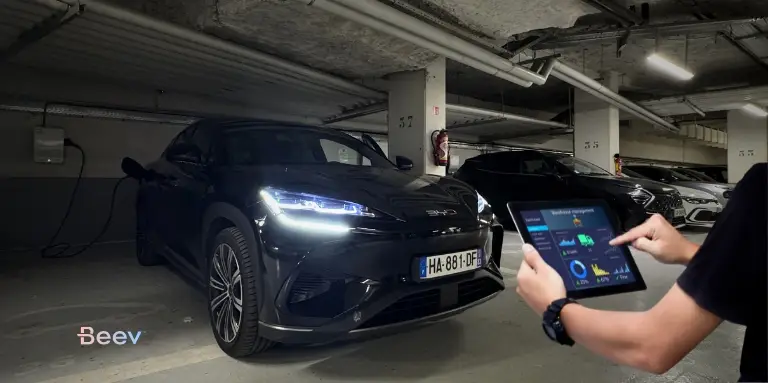
- Charging stations, Fleet management, Electric cars

- Fleet management, magazine, Professionals, CSR, Electric vans, Electric cars

- Taxation of electric cars and charging stations, Fleet management, Electric cars
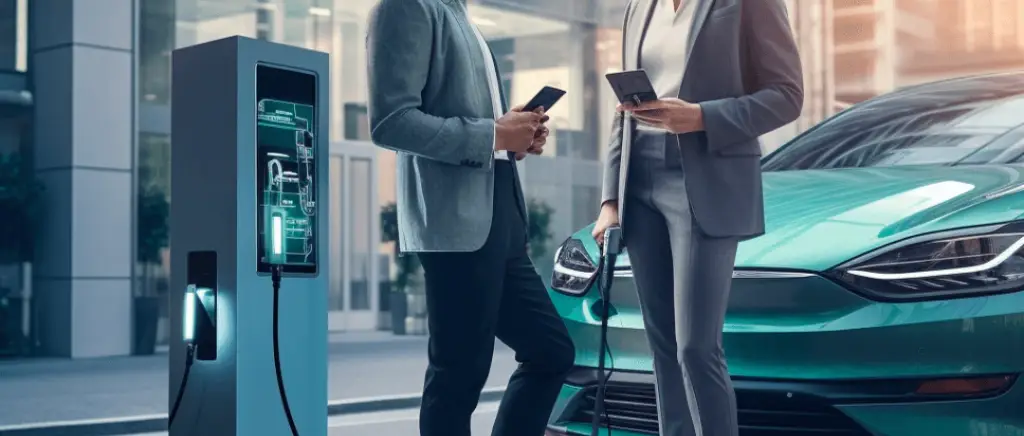
- Charging stations, Fleet management, Professionals
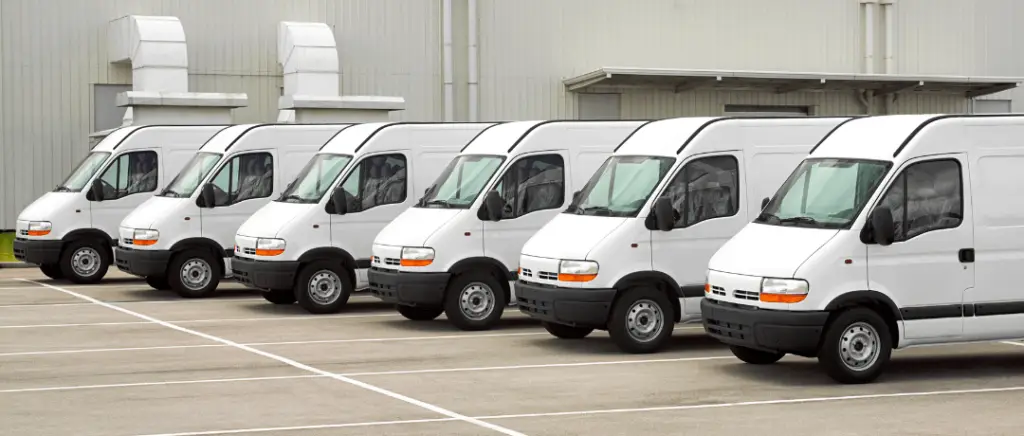
- Fleet management, Professionals
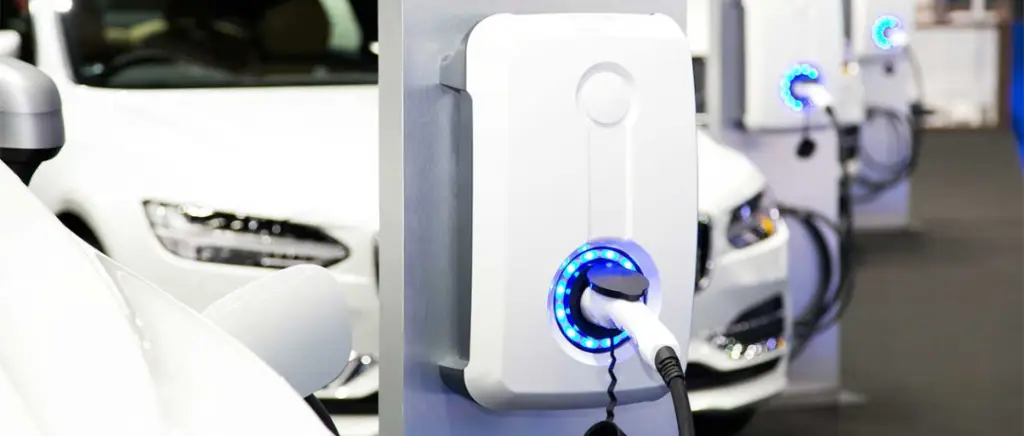
- Fleet management, magazine, Electric cars
Do you have a question about fleet electrification?
Why electrify a company fleet in 2025?
Electrification makes it possible to reduce running costs (recharging, maintenance), meet regulatory requirements (LOM law, ZFE) and improve the company's CSR image. Electric vehicles also offer greater comfort for drivers.
What are the current legal obligations?
Since 1 January 2025, companies with more than 50 employees and a fleet of more than 100 vehicles must include at least 20 % of low-emission vehicles in their annual renewals. This quota will rise to 40 % in 2027 and 70 % in 2030. There are financial penalties for non-compliance.
What financial assistance is available?
Companies can benefit from subsidies such as ADEME's "Tremplin pour la transition écologique" scheme, which finances studies, diagnostics and investment in sustainable mobility.
How is Beev supporting the electric transition?
Beev offers a personalised audit of your fleet, identifies vehicle and charging infrastructure requirements, and provides a free platform to manage your electric fleet, track costs in real time and monitor CO₂ emissions.
What are the economic advantages of an electric fleet?
Electric vehicles cost around four times less to recharge than internal combustion vehicles, and require less maintenance. What's more, they save money thanks to the financial assistance available.
How do you manage an electric fleet effectively?
We recommend using management tools such as the Beev platform, which allows you to view key vehicle data, monitor the status of charging points and optimise the fleet's energy performance.